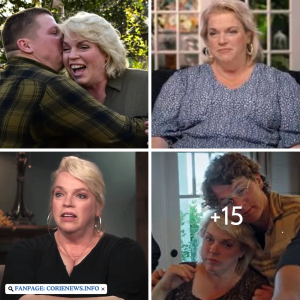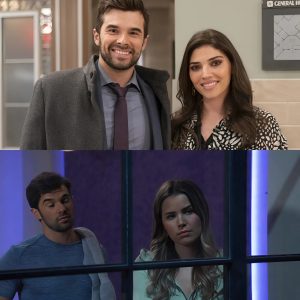The drama in General Hospital is about to reach a fever pitch, and fans better brace themselves because Port Charles will never be the same again. What begins as a shocking death soon spirals into a tangled web of lies, paranoia, and betrayal that leaves more than one life shattered. The murder of Judge Eva Haran is the spark that sets fire to the city, but the flames don’t stop with her. Instead, they consume Drew Cain, Willow Tate, and Marco Rio—while the real mastermind, Jen Sidwell, walks away nearly untouched.
The morning Judge Haran’s lifeless body is pulled from the harbor, whispers ripple through the docks. Sirens wail, crowds gather, and almost instantly, the rumor mill starts grinding. Port Charles has seen its fair share of tragedies, but everyone knows that in this town, nothing is ever simple. When someone dies under mysterious circumstances, there’s always a conspiracy waiting to be uncovered. And Judge Haran, feared and respected in equal measure, was never short on enemies.
Judge Haran carried herself with iron authority, but beneath the robe, she harbored secrets. Rumors had long circulated that not all her rulings came from impartial justice—many suspected unseen influences shaping her decisions. Now, her suspicious death seems to confirm those whispers. The city quickly points fingers, and though some suspect Jen Sidwell, the seasoned manipulator is already two steps ahead. Sidwell thrives on deception, using lies like weapons and pawns like shields. This time, he needs a scapegoat—and he finds one in Drew Cain.
For Sidwell, Drew is both expendable and believable. Once an ally, now a perfect target. He crafts a twisted illusion, feeding just enough truth to his son Marco to sell the lie. Sidwell tells Marco that Judge Haran once accepted a bribe in the custody battle involving Michael Corinthos and Willow Tate. What he leaves out, of course, is that he orchestrated the entire scheme. To Marco, the story seems authentic, and with a heavy heart, he passes the information on to Drew, believing he is doing the right thing.
But fate takes a cruel turn. Mere hours after Marco confides in Drew, Judge Haran ends up dead. The timing convinces Marco that he made a deadly mistake. In his mind, the logic is undeniable: Drew must have silenced Haran to protect himself. Terror consumes Marco. He begins to see Drew as a ruthless man capable of killing again. Every creak outside his door, every shadow on the street, becomes a threat. Certain that he is next, Marco confides in Willow Tate.
Their conversation is steeped in fear. Marco tells Willow that Drew knew about the bribe and silenced Haran before the truth could spread. For Willow, who has lived through devastating custody battles, the revelation is like a knife reopening old wounds. She remembers the pain of losing, the sting of betrayal, and Michael’s improbable victory. Could Drew have manipulated everything? Did the man she trusted orchestrate her suffering from the start?
The more she thinks about it, the darker her thoughts become. She convinces herself that Drew not only bribed the judge but also murdered Haran to cover it up. Rage and grief fuse into a volcanic storm. When Willow finally confronts Drew, her fury explodes. She accuses him of corruption, manipulation, and murder. Drew is blindsided. He insists he is innocent, pleading that Sidwell has set him up. But Willow no longer hears reason. Each denial sounds like another lie.
The confrontation spirals out of control. Fueled by betrayal and heartbreak, Willow lashes out in violence. In a tragic instant, Drew Kane falls—not by Sidwell’s hand, but by Willow’s. Marco, watching the chaos unfold, becomes trapped in his own fear and guilt. Convinced that Drew truly would have killed him if given the chance, Marco steps in and helps Willow finish what she started. Together, they become unwilling accomplices in murder, pawns tangled in Sidwell’s web.

The tragedy deepens when Sidwell, the true architect, remains untouched. He watches from the shadows, his plan executed flawlessly. Drew is dead. Willow is shattered. Marco is condemned. Sidwell even views his son’s downfall as a victory—punishment for Marco’s defiance. He ensures Marco is implicated further, sealing his fate behind prison walls. Cold, calculated, and ruthless, Sidwell walks away clean, his enemies eliminated by his lies.
But the storm doesn’t end there. Willow and Marco, both wracked with guilt, begin to unravel. Willow tries to convince herself that she acted for justice, that Drew was guilty. But her heart gnaws with doubt. What if Drew was telling the truth? What if she killed an innocent man? Each reflection becomes a nightmare—Drew’s face haunting her, his pleas echoing in her ears.
Marco spirals too, plagued by paranoia and visions of Drew seeking vengeance. He grows distant, consumed by the fear that Willow might one day silence him too. Their fragile alliance cracks, turning toxic. Instead of supporting each other, they trade accusations and mistrust. Sidwell, of course, fuels the chaos by spreading whispers that Drew bribed Judge Haran. With Drew gone, the rumor gains traction. To the city, the story fits neatly: Drew orchestrated the bribe, Haran tried to resist, and Drew silenced her forever.
Willow clings to that narrative to shield herself from guilt, but it only binds her tighter to Sidwell’s scheme. Marco, meanwhile, edges closer to collapse. His fear of discovery becomes unbearable until he makes a desperate gamble—he reaches out to Sonny Corinthos. From his holding cell, Marco spills fragments of the truth, painting himself as a pawn but pointing the finger at Sidwell. Sonny, seasoned in reading lies, listens carefully. He doesn’t fully trust Marco, but he senses Sidwell’s corruption beneath the chaos.
As Sonny investigates, Willow spirals further. Haunted by Drew’s memory, she starts talking aloud to him as if he were still there. Her erratic behavior draws suspicion from Chase and others, but she deflects, clinging harder to Sidwell’s fabricated narrative. Still, guilt gnaws at her. Each day, she grows more volatile.
The climax arrives when Sidwell’s arrogance becomes his undoing. In a rare misstep, he leaves a trail linking him to Haran’s bribe. Sonny seizes the opportunity, using Marco as bait to set a trap. But when Willow learns Marco has been speaking to Sonny, she panics. Certain that Marco will expose her role in Drew’s death, she confronts him in a heated showdown. Marco, weary and broken, throws the truth at her—she is no better than him, just another pawn in Sidwell’s ruthless game.
Before Willow can fully process his words, Sidwell himself storms into the confrontation. His mask slips completely as he mocks Marco for his weakness and taunts Willow for being so easily manipulated. Though he never outright confesses, his venom drips with enough truth to confirm his guilt. The revelation shatters Willow. She realizes she murdered Drew based on a lie, manipulated by Sidwell’s cruelty. Marco, too, feels the final sting of betrayal from the man he once called father.
For a fleeting moment, Marco and Willow share an unspoken bond—they were victims, not villains. But the moment doesn’t last. Sidwell attempts to flee, and chaos erupts. In the end, it is Marco who makes the ultimate choice. Driven by rage, resentment, and betrayal, he strikes against his father. Sidwell falls, fatally wounded by his own son—the final victim of the empire of lies he built.
The aftermath leaves Port Charles reeling. Sidwell’s corruption is exposed, but the cost is staggering. Drew is dead, Willow is broken, and Marco is once again behind bars—this time for killing his father. To some, Marco is a tragic figure rather than a villain, but the scars remain. Willow withdraws into isolation, haunted by guilt she cannot shake. Sonny, weary but resolute, reflects on the high price of justice.
Though Sidwell is gone, his shadow lingers. The lies he spread live on, poisoning memories and reshaping truths. Willow and Marco will forever bear the scars of being pawns in his game, and Drew’s death will echo through Port Charles for years to come. Because in this town, scars aren’t endings—they’re only the beginnings of the next storm.





